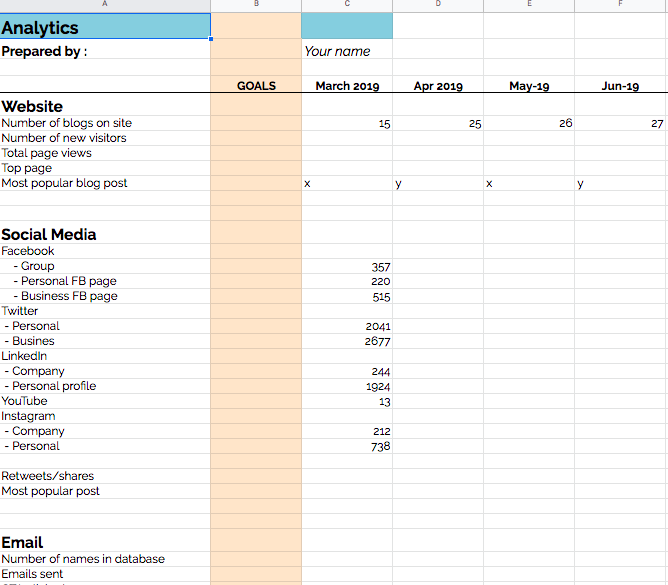 A true niche is ONE targeted, focused area that you serve particularly well.
A true niche is ONE targeted, focused area that you serve particularly well.
The ultimate and most profitable niche is one that is exclusive. It’s unique. Either no one else is serving that niche, or they’re not serving it in the same way you are. So you truly stand out.
But…can you have more than one?
What if you’re ready to step up your marketing? You’ve got multiple niche areas that you’re either excited about – or you’d like to try? How many is too many?
When you choose more than one niche, you run the danger of massively increasing your marketing efforts.
Similar to running two businesses, you’ll need to consider a different audience every time you think about content.
Is this guide you’re writing for this niche or that one?
Where will you post it – does all the niche content go on one branded social platform, or do you have multiple ones?
Speaking of brand, will you need a new brand for each niche, or a sub-brand? Or can you do it all from one?
The questions begin to mount up with multiple niches.
However!
In your journey to find and choose a niche, it’s absolutely okay for you to try several niche areas and do testing to see what’s the most effective, profitable, likeable one for your firm.
Testing is the key.
You are not saying you niche (or exclusively niche) in two or three or fourteen areas. That’s not a niche, and your audience will pick up on that straight away.
What you’re doing is creating content which is helpful for a few niche areas, with the intention of discovering what actually works. Which of the target markets you’re considering is the best one for you…and which of them find you to be the best accounting firm for them.
In your testing phase, I would suggest no more than three potential niche areas.
If you’re truly going to serve a niche – or even test it – you’ll need to really give it focused attention.
Create unique original content. Listen to what your clients and prospects are saying. Record videos. Create a landing page that is unique to them. Run an event. Create a community group. Send emails.
That’s a lot of work if you’re going to do it well.
More than three and you’re simply faking it, and the prospects will pick up on that.
Think first before you select your tester niche areas
Do your niche areas integrate at all? Do you really have three niches, or do you have one niche, with three types of people within it? You could have a niche area of creatives, with three sub-sets of digital agencies, graphic designers, and photographers. They’re all creative, but each have their own style, and their own issues.
Do you have expertise in this niche area yet? It’s okay if you don’t – you can build this as you go – but that will be their first concern. You can either answer it by saying “this is a new area and we’d love to help you”, or you can use quotes from other businesses who had problems similar to your niche area.
Who will be doing the detail marketing work? Testing three niche areas is a lot of work – researching issues and problems, creating content, designing imagery, building landing pages, sharing social posts, recording video…. It’s critical to identify what work you’re going to do, and what work you’ll outsource to someone else (either because they are the experts, or because your time can be used better elsewhere). The knowledge in your head is absolutely key – I’m not advocating that you outsource that – but once you get it out of your head, someone else can help you a lot with the detail marketing work, to save you time.
Are you ready to commit to at least 6-12 months of testing? Do not, under any circumstances, go to a great deal of work to test a niche for a month or two. There’s really no point. That’s usually not enough time to evaluate whether there’s takeup on your content, whether this is an area you really like, whether all your marketing efforts are integrating together to deliver results, what changes you need to make…. Be committed, and track everything.
Where are you tracking & analysing the marketing numbers? We suggest a simple Gsheet to start, with the categories of numbers relating to:
- Website
- Clients
- Prospects/proposals
- Social media (by channel)
You can do many more, but this is a good start. I’d suggest 5-10 numbers per category, and tracking details for all your social media channels, at a minimum.
Look at the whole marketing picture. You’re not trying to figure out if your Facebook ad worked, on its own. You’re trying to figure out if all the marketing efforts you’re making for veterinarians or physicians or agencies, are coming together and beginning to build up an audience you can sell to.

Do you know what a “lead” is? It’s tempting for you to think that a lead is “someone who is ready to get a proposal”. That’s not technically true. A lead can simply be someone in your niche area who is interested, but isn’t ready to buy yet. Set your expectations according to what is realistic (ie lots of leads, and a few true enquiries) as opposed to an imaginary dream of magical marketing (ie lots of leads, every one of which results in a proposal, most of which are accepted). You’re looking at the long term here, and building relationship.
Create content for your tester niche areas
Now that you’ve identified that you have a few potential niche areas, you’re ready to start creating content for them. Some things you can create for your tester niche area are:
Landing page on your website.
Create a unique page on your website for that niche area. Be specific, and direct it to them and them only. Do not create one page and then replace the type of business with “dentist” or “creative agency” or “photographer”. That’s not niching, that’s shortcutting, and it won’t work.
Make sure to include the following on your landing page:
- Why are you serving this niche? (you like it, you have expertise in it, your father/partner/family member is in this niche, etc)
- What are their unique problems & issues? (be so specific that they feel you ‘get’ them)
- How do you help solve these problems? (this is essentially your ‘services’, but be more interesting than a list of services. Show them how you can take away their pain)
- What stories do you have to prove how you can help? (case study, story, testimonial, quote – again be very specific, and give a real person’s name)
- What one thing do you want them to do? (download a guide, sign up for email tips, attend an event, watch a video) Most of the time you’re going to give them something that is free, requiring little or nothing from them, and letting them get in touch when they’re ready.
You don’t have to put all your tester-niche pages on the main menu of your website. Main menus are becoming irrelevant, anyway. People either do a search to find the page they’re looking for, or they link to it from something else – an email, a social post, a video. Don’t stuff your main menu items just because you have a new page.
Free cornerstone piece of content
This is something to draw them in, which is genuinely useful and helpful. It might be something like…
- PDF guide – good, solid content that solves a problem for them. They could read the whole guide and do everything themselves, without even needing to come to you. (What actually happens is they read it, are impressed with how much you know, realise they don’t have time, and come to you anyway.)
- Video series – you could train them in something, show them how to do something they’re finding difficult. Xero or Quickbooks training, creating a budget or forecast, using an app. Be specific, make it relevant to them.
- Email tips – a short, focused, niche tip you send out every whatever (day, week, month). Make sure the email is actually targeted. Generic will be useless and no one will read it and they’ll eventually unsubscribe. Better to send one a month that they enjoy and appreciate and reply to, rather than one a week which is like everyone else’s.
Social media content
Yes, you’ll want to use social to share all the great content you’re creating. But you also want to use it to draw in those who are part of your niche.
For accountants, when you’re posting content related to your niche on social, you’ll be tempted to make it nearly 100% accounting-finance-tax-bookkeeping type content.
Remember, social isn’t entirely about you. Yes, there’s some sharing of yourself – who you are, what you do, the clients you serve, the victories you got for your clients, your workshops and events, your new video, your new offices.
But you also want to sprinkle your social with content that is from others who are creating great content for your niche audience. Go for a 40-60 split, so 40% of your content is about you (the points just noted above) and 60% of it is about stuff your target clients care about. This 60% can be from you or from others, and ideally you include a lot that’s from others. Share things your clients are doing, articles they’ve written, videos & stories & content from those who serve your niche, non-accounting-related stuff for your niche.
Run an event for your niche
Delivering an event with your niche audience present is one of the best ways to determine if this niche is for you (and you for them).
First, you’ll discover whether you actually have enough of these to invite to something. If you can’t even get 4 or 5 people in a room, you may need to back up and do some of those other things first, and build your list.
If you do have enough people to invite some to get together, ask yourself: Why are you running this event?
What’s in it for them?
Your event needs to be really appealing, a real draw for this niche audience. Your reason for running the event cannot be “because I want to get more clients in this niche”. That will become apparent, they’ll feel the sales pressure, and it won’t work.
You can do this by…
- Inviting a guest speaker your niche audience knows and is impressed by. One of our clients ran an event for creative agencies with a very well known guest speaker in that industry. He got 60 people signing up in a few days and had to get a bigger venue.
- Choosing a topic that is exclusive and specific. Does your niche struggle with finding funding in less than 30 days in order to buy equipment? Run an event on that.
- Keeping it really small. Better to have 5 people you can spend focused time with than try to get 50 or 500 people you don’t have time to follow up with. You’re in testing phase, remember!
Whatever you do, make sure you follow up. Use all that great content you’ve created to point them back to your useful landing page, back to the cornerstone piece of content, back to your social platforms where you can build relationship.
Final stage: evaluate and decide
Once you’ve worked on and with this niche for 6-12 months, review the analytics you’ve been tracking. (You have been creating and analysing all your marketing numbers, right? Right.)
Look for patterns.
What’s working? Where are you getting engagement? What kind of replies, interest, emails, comments, direct messages, calls are you getting?
What ISN’T working? What posts are a fail, what content is no one downloading, which event did no one attend?
…and of course ask yourself WHY.
Just because no one downloaded your content doesn’t mean this niche is a bad idea: you may need to change the content. Give it a better title. Put it in a different place. Get small quotes from it which will draw people in to the longer form content.
And go back to the key questions about serving a niche, which are:
- Can you help them (and are you helping them) particularly well? Are you delivering results for them?
- Is it (or will it soon be) profitable? A niche has to be profitable, or you’ve got to make it be so pretty quick.
- Do you like working with them? You can’t effectively serve a niche you don’t like, don’t respect, don’t appreciate.
Once you’ve reviewed all that, make your decision.
You may get rid of one of the three niches and only go with two for a while.
You may get rid of two, and focus on only one.
And – shock, horror – you might actually discover with all this effort and time and money and investment that none of these three areas are ones you want to focus on.
Please rest assured that this is a win! This is a success. You’ve found the answer. You’ve done the work, you’ve tried different things for a long enough period of time, you’ve explored it – and you realised that it’s not worth focusing on for the next 3 years or 10 years or the rest of your business life.
What a great success.
Of course, you may also discover that all of these three niches are amazing and profitable and likeable….which means your only decision now is, which one is the most amazing? Which one is more profitable than the others? Which do you absolutely like the best and has the most staying power?
And you can move forward with getting to the ultimate goal of having one niche. One focus area that you serve particularly well.
Go to it!

